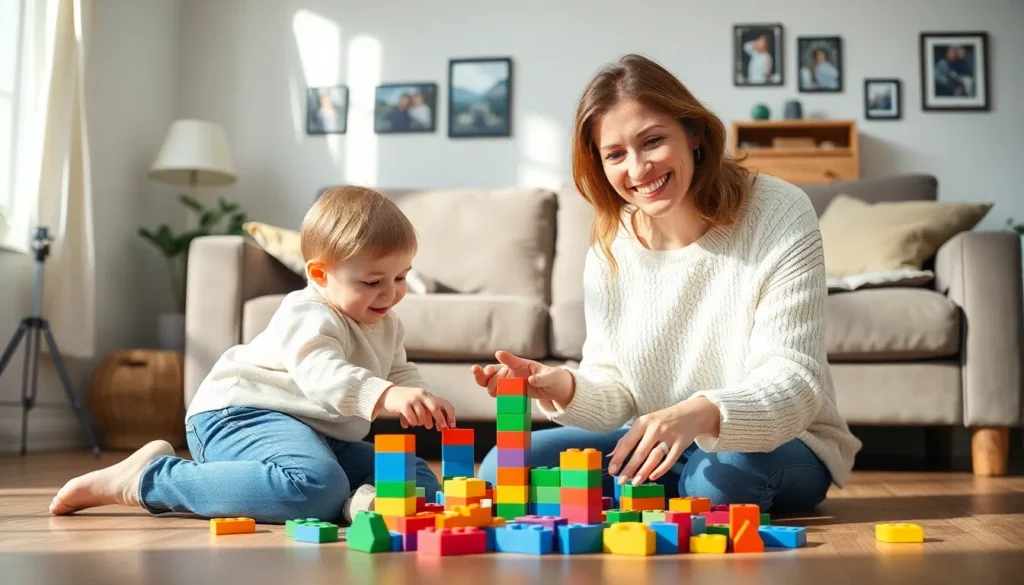Table of Contents
ToggleFinding the right juvenile therapist can feel like searching for a needle in a haystack. With so many options out there, it’s easy to get overwhelmed. But fear not! The perfect therapist is just around the corner, ready to help navigate the turbulent waters of adolescence.
Imagine having someone who understands the unique challenges teens face today. Whether it’s anxiety about school, social pressures, or just the drama of growing up, a skilled juvenile therapist can make a world of difference. They’re like the GPS for emotional well-being, guiding young minds towards healthier paths.
So why wait? Discovering a local juvenile therapist could be the first step towards a brighter, more balanced future for your teen. After all, every superhero needs a sidekick, and who better than a therapist to help them conquer their inner villains?
Understanding Juvenile Therapy
Juvenile therapy addresses mental health needs specific to adolescents. This form of therapy provides support and guidance tailored to young people’s challenges.
What is Juvenile Therapy?
Juvenile therapy focuses on helping adolescents navigate emotional and behavioral issues. It employs methods like cognitive-behavioral therapy and play therapy. Trained professionals guide teens through their struggles, fostering open communication. This environment encourages self-expression and problem-solving skills. Services might include individual or group sessions, depending on the needs of the teen.
Benefits of Juvenile Therapy
Juvenile therapy offers numerous benefits that directly impact young people. Improved emotional regulation often results from therapeutic interventions. Strengthened coping strategies help adolescents manage anxiety and stress better. Social skills development emerges through interactions with peers in therapy. Enhanced self-esteem allows teens to approach challenges with confidence. Overall, therapy serves as a critical resource for emotional health, aiding adolescents in their growth and development.
Finding a Juvenile Therapist Near You

Locating a qualified juvenile therapist nearby plays a crucial role in supporting a teen’s mental health. Several effective methods can simplify this search.
Online Resources for Locating Therapists
Utilizing online directories offers a straightforward way to find therapists. Websites like Psychology Today or TherapyDen allow users to filter results by location, specialties, and age groups. Many platforms provide profiles that detail therapists’ qualifications and approaches. Checking local health department resources can reveal community-based options. Online reviews often shed light on patients’ experiences, helping in making informed decisions.
Asking for Recommendations
Engaging friends or family for suggestions often proves valuable in finding a therapist. They might know professionals who specialize in juvenile therapy. Schools or pediatricians frequently have trusted contacts. Utilizing local community groups also enhances the search, with members sharing personal experiences. Listening to these recommendations can guide parents toward suitable candidates who understand their teen’s unique challenges.
Types of Therapy Available
Therapy offers diverse approaches suited for adolescents. Each type addresses distinct needs, fostering emotional growth and resilience.
Individual Therapy
Individual therapy provides personalized support tailored to each adolescent’s challenges. A therapist engages one-on-one with a teen, creating a safe space for open dialogue. Techniques such as cognitive-behavioral therapy enhance emotional regulation and coping skills. Adolescents benefit from focused attention, allowing them to explore issues like anxiety, depression, or identity. Trust between the therapist and teen encourages self-discovery, promoting overall well-being. This approach often leads to significant improvements in self-esteem and personal insights.
Group Therapy
Group therapy involves small gatherings of adolescents under the guidance of a therapist. In this setting, participants share experiences and challenges while supporting one another. Interaction with peers fosters social skills, communication, and empathy. Group therapy often addresses common issues such as peer pressure or self-image, helping teens feel less isolated. By gaining insights from others, adolescents refine their coping mechanisms and develop healthier perspectives. Such connections often lead to lasting friendships, benefiting their emotional growth.
Factors to Consider When Choosing a Therapist
Selecting the right therapist for a teen involves several critical considerations. These factors help ensure that young individuals receive the best possible support for their emotional and mental health.
Credentials and Experience
Therapists should possess relevant qualifications and specialized training in juvenile therapy. Look for credentials like a master’s degree in psychology, social work, or counseling. Experience working specifically with adolescents enhances a therapist’s ability to address age-related issues. Checking for licenses, such as Licensed Professional Counselor (LPC) or Licensed Clinical Social Worker (LCSW), confirms a professional’s qualifications. It’s beneficial to inquire about their work history and success stories with teens. Engaging with a therapist who understands adolescent development can make a significant difference in creating a supportive environment.
Approaches and Specialties
Therapeutic approaches should align with a teen’s specific needs. Techniques like cognitive-behavioral therapy (CBT) focus on altering negative thought patterns, helping adolescents manage anxiety and depression. Some therapists emphasize play therapy, which caters to younger teens, fostering communication through creative expression. Identifying a therapist who specializes in issues like trauma, ADHD, or social anxiety can yield better outcomes. It’s essential to understand what methods the therapist employs, as a comfortable fit enhances the therapeutic experience. Choosing the right approach fosters emotional growth and resilience in adolescents.
Finding the right juvenile therapist can significantly impact a teen’s emotional health. It’s essential to prioritize a therapist who understands the unique challenges adolescents face. By leveraging local resources and recommendations, parents can connect with qualified professionals who specialize in juvenile therapy.
The journey towards emotional well-being often starts with the right support. Engaging in individual or group therapy provides teens with the tools they need to navigate their struggles effectively. With the right guidance, adolescents can develop resilience and coping strategies that will serve them well into adulthood. Taking this step is a vital investment in a teen’s future.







